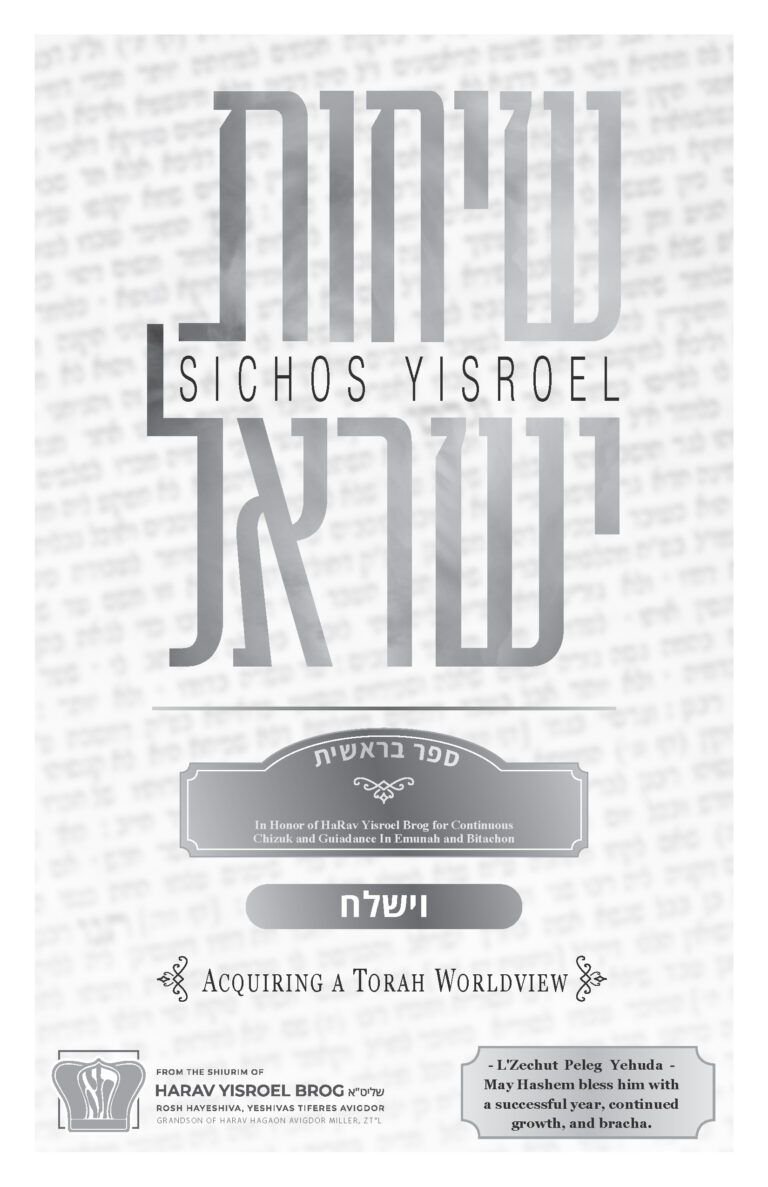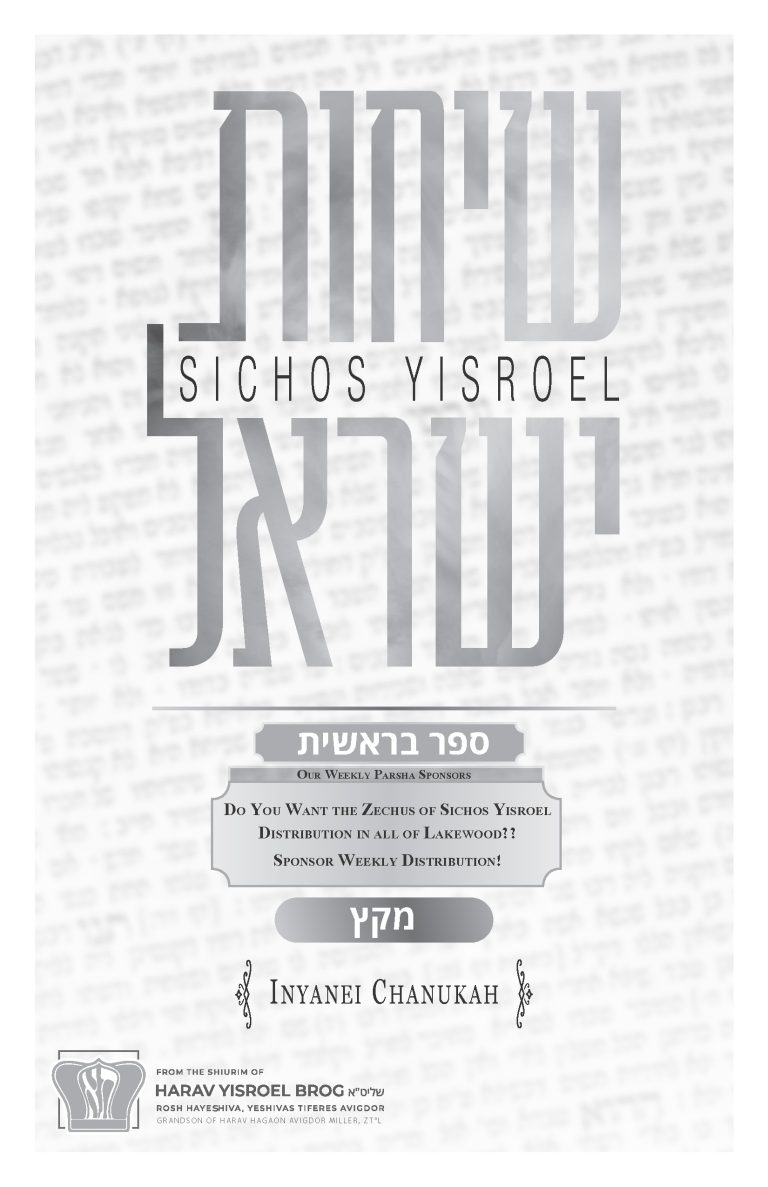Vayigash 5783: Relating To the Unique Challenges of Yosef HaTzaddik
Sponsored
For Hatzlocho In Raising A True Torah Family by Mishpachat Amzalag
Consider sponsoring a shiur
Visit YTATorah.org
Shiur presented in 5778
I am Still Yosef, Still Your Brother
In this week’s parshah, there are a lot of powerful lessons to be learned. Yosef comes face to face with his brothers, and he reveals himself to them. Now, the passuk (Bereishis 45:4) says, אני יוסף אחיכם, I am Yosef your brother, אשר מכרתם אותי מצרימה, whom you sold to Mitzrayim.[i] My Rebbi (HaRav Meir Halevi Soloveichik, zt”l) asked the following question: what was Yosef coming to add when he said אני יוסף אחיכם?
Yosef already introduced himself to his brothers in the previous passuk (ibid 45:3) and said אני יוסף, and they didn’t say, “No, you’re not.”[ii] They were mekabel his words. It says, נבהלו מפניו, they became confounded. So what was the message he wanted to relate now when he said, אני יוסף אחיכם, “I am Yosef your brother”?
Another thing that needs to be understood, my Rebbi said, is why did he have to say אשר מכרתם אותי, that you sold me to Mitzrayim? Isn’t that obvious that they sold him? Don’t they know that?! Once he said ‘I’m Yosef,’ then obviously, I am the one ‘whom you sold to Mitzrayim!’
Now, Rashi in Parshas Vayechi (Bereishis 47:31) says that Yaakov Avinu bowed down at the head of the bed, and he thanked Hashem, first, for having a family that none of them were reshaim, and second, that even though Yosef was taken captive amongst the goyim, he still remained whole in his righteousness. My Rebbi pointed out that Rashi (Bereishis 47:31) doesn’t say שהוא צדיק; Rashi uses the language והרי הוא עומד בצדקו – he [Yosef] remained righteous.[iii]
My Rebbi explained that Yosef wanted to teach his brothers a phenomenal lesson, and that is, in spite of everything that transpired to Yosef on account of the sale and their sinah, in spite of all that, he said, “From my perspective, I am completely your brother. I have nothing in my heart against you.”
People Who Maintain Their Pain
Now, naturally, if someone would try to take his brother’s life or sell him as an eved because he doesn’t like him, that brother would bear tremendous sinah, tremendous hatred against him. Today, you find children who feel hatred toward their parents. I’ve met so many people who feel they weren’t treated properly by their parents, and because of that they detest their parents. They hate their parents. They don’t talk to their parents. And their parents never sold them into slavery, and never put them to work delivering papers and then taking the money from them.
I met people who hate their siblings. Usually, it’s over money. One of the siblings got the better, the upper hand, over the other one. Or one of them feels disrespected and looked down upon by the others because they’re not so matzliach. The nature of hate is that when you are angry at somebody, it doesn’t dissipate over time. The anger builds up, and it fills the heart. It overpowers the heart, and it becomes an integral part of people’s lives. I can’t begin to tell you how many people I have spoken to who have this issue.
If the Torah put it in, I assume it’s not that uncommon – even though maybe selling to slavery is extreme – but the fact that you got thrown ‘under the bus,’ or you feel you were thrown ‘under the bus’ by somebody in your family, is not that uncommon. The nature of a person is if somebody wrongs them, they get ticked off, they get angry. They believe that their parents were the cause of their downfall. They believe their brother or their sister was the cause of their downfall. They believe people have hurt them.
A Ba’al Bitachon Knows it’s Only Hashem
You have to know that Yosef Hatzaddik understood there is nothing else in the world that has any power aside from Hashem. He was a tremendous ba’al bitachon. He was שם ה’ מבטחו ולא פנה אל רהבים, he never turned to nonsense.[iv] He never imagined that people, or boogie men, or monsters, had any power to challenge him. It was clear to him that whatever happened was done al yedei Hakadosh Baruch Hu Who controls the world with all its details,אין אדם נוקף אצבעו, a person doesn’t knock his little finger למטה, down here, אלא אם גזרו עליו מלמעלה.[v]
People detest their spouses because of imaginary or real abuse. They think that the spouse has an ability to actually bring upon them hurt and pain. They don’t. Only Hakadosh Baruch Hu has that koach. And since everything comes from Hakadosh Baruch Hu there’s no place for a ta’anah on the human being who brought this upon me because this is what the chochmah of Hashem was gozer. Therefore, in the heart of Yosef, there did not sprout or grow any bitterness and sinah toward his brothers because of the sale, or becuase of anything else that resulted from that sale.He pashut felt the same way he felt toward them before the sale took place.
That’s what Yosef meant when he said: אני יוסף אחיכם, I am Yosef your brother, in the zelbe (same) matzav that was before you sold me. I’m the zelbe brother that you sold to Mitzrayim. And I am just like when I was in my father’s house before the sale.
The brothers hated him. He already knew that before they sold him. It didn’t start at the time of the sale. [How bad was it?] Ad kedei kach, the Torah testifies that the brothers couldn’t talk to him. They couldn’t talk to him beshalom. Yosef himself had no ta’anos against them. His achvah, his brotherhood, had no pegam and no chisaron. Achvah gemurah. Even when the man said to Yosef, “Who are you looking for?” Yosef said, “I’m looking for my brothers.” You know what the man said? נסעו מזה, they went away from here. What does Rashi (Bereishis 37:17) say over there? הסיעו עצמן מן האחוה, they had made a decision: He’s not our brother anymore. נלכה דתינה, they said let’s go to Dosan, and over there we’re going to plot his death.[vi] Nevertheless, after the man told him that, what was Yosef’s response? וילך יוסף אחר אחיו, Yosef went after his brothers, and he treated them with achvah. He was pashut going bemesiras nafsho to find out how they were doing, so he could report back to his father.But, as we know, they took him, and put him in the bor with nachashim v’akravim. Afterwards, they took him out, and they sold him to Yishmaelim. If this would continue happening in this sequence to any normal person, the guy would have had a heart attack. He’d blow his brains. Pashut he’d be burning mad. How could you do this to me? Could you imagine what would happen if somebody did just a tiny bit of this to you? You’d go berserk. And then the brothers take Yosef out of there, and they sell him to the Yishmaelim! The medrash says that Yosef laid down in front of each brother separately and pleaded with them for rachamim. And they didn’t want to have rachmanus on him. Could you imagine that? And his achvah wasn’t diminished ki hu zeh klal. (You see a peledike zach. Even though he had tremendous bitachon, he still was mevakesh rachamim from them) And he didn’t get full of bitterness. It doesn’t say once he was bitter. It doesn’t say the guy was walking in a cage in Mitzrayim thinking, “Shrek! How can I pay them back?”
A Unique Mikvah Experience
I once had a kid I took in, who stayed in my house. He was a problem kid. This was many years ago. He misbehaved. He gave me a very hard time. He was a challenging child. He was a challenged child. His older brother was watching how he was behaving towards me and my family. One day he told him, “I’m giving you a warning. You better shape up. I’m telling you. The person gave you his life! He opened his home to you. He gives you everything. He supports you. He’s raising you. You better behave.”
One night, his older brother took him for a walk. He said, “I want to talk to you.” He took him downstairs to the mikveh in Telz. This guy also thought he was Mr. Macho man. His brother was a tzaddik of a guy. I don’t know how his brother did it, but his brother managed to push him over the wall of the mikveh and to hold him by his feet, and start to make a tevilah with him, with his head down. He dipped his head in. I guess that was the first form of waterboarding. He put him in there, pulled him out. He said, “Are you going to change?” “No.” Finally, after the boy had enough, he said, “Okay, I’m going to change.” He told me the next day, “When I grow up, I’m going to kill him.”
And with Yosef, this thought didn’t even enter his mind. There was no bitterness. Just like before the mechirah he had nothing against them, after the whole gilgal to Mitzrayim and after what he suffered in Mitzrayim with Eishes Potiphar,and in the jail, he had nothing against them. He should have been a raging bull in that jail. He should have been a person who was so angry in that jail, that pashut, you wouldn’t be able to get near him. I don’t understand him. Could you imagine that? Could you imagine what a raging bull he should have been? I can’t imagine.
But Yosef Hatzaddik, not only was not raging, he wasn’t a bull. Hashem was with him and he was with Hakadosh Baruch Hu and he had no sinah toward his brothers. He says to them, “I’m Yosef, your brother, whom you sold to Mitzrayim. Despite that, I am still your brother.” He wasn’t coming to cause them pain and hurt. Lehepech. He wanted to tell them, just like I never divested myself of the brotherhood, I never had against you any sinah and any ka’as, so too, now I feel like that also, without hatred and without ka’as. It’s ke’eelu nothing happened. So don’t feel bad. Don’t feel sad. Don’t get angry. Because Hakadosh Baruch Hu was mesavev hadevarim and I don’t have any shaychus to being upset because of what happened. לא אתם שלחתם אותי הנה, it wasn’t you that sent me here.
The emes is that even though Yosef went through so much because of his brothers – not only did he not have any hatred [towards them], he wasn’t even bitter against Hashem. You know why? Because tzaddikim understand that you don’t live for olam hazeh. Our condition in this world is not the end game. Our situation in olam haba is the end game. Tzaddkim, my Rebbi used to say, they laugh off all the olam hazehdike challenges, because they understand what olam hazeh is. Even when Yosef became the melech in Mitzrayim, and he went from the depths of the depths, to the heights of the heights, it doesn’t say he got excited. The Torah should have written ‘and Yosef was very happy on that day that he finally saw sunlight: ויטב הדבר בעיניו מאד. But it doesn’t say that in the Torah. You know why? Because for Yosef it didn’t make a difference, because he understood.
Two Approaches to Yesurim
I want to tell you a machlokes in hashkafah of how to view yesurim. Most people in the world are aware of the famous story with the Rebbe Reb Zushe (Rabbi Meshulam Zusha of Hanipol, 1718-1800), a famous ‘chassidic master,’ as they call it today. One time, a chassid came to the Rebbe who was known as the Mezritcher Maggid, and he said to the Mezritcher Maggid (Rabbi Dov Ber of Mezrich, 1704-1772), “What’s the pshat in the gemara in Brachos (54a) that says: חייב אדם לברך על הרעה כשם שהוא מברך על הטובה – a person is obligated to bless Hashem for the bad just as he blesses Him for the good. The gemara says, “Do you know what that means? חייב לקבלינהו בשמחה. Just like tovah one is mekabel besimchah, so so too ra’ah you’re mekabel besimchah.” So the chassid asked, “How is it possible for a person to thank Hashem for the ra’ah, like he’s modeh al hatovah. How is the simchah shayach?”So the Mezritcher Maggid told him, ”Go to Reb Zushe and ask him the shaylah and he’ll give you the teshuvah.”
So the chassid went to Reb Zushe, and he asked him the shaylah. Reb Zushe said, “I can’t answer this shaylah because I never experienced any ra’ah in my life. You have to go to somebody who experienced tzaros veraos.”You hear? The chassid came back to the Mezritcher Maggid and he told him, “I was there. There must be some mistake. I came to ask him, and he told me some answer that had no shaychus.” “What did he tell you?” “He told me that he never experienced any ra’ah. I never experienced anything bad in my life.” The Maggid said to him, “Reb Yid, that was the teshuvah. He did answer you. That’s why I sent you to see Reb Zushe. All his life he lived bedachkus. He lives beaniyus, poverty, terrible poverty. He suffers from yesurim noraim and all kinds of pains. And im kol zeh he doesn’t see any ra’ah in his life. Everything is tovah be’einav. That person could be מודה על הרעה כמו על הטובה.” It means, if a person has the proper emunah,everything that happens in his life is tovah. He doesn’t see any ra’ah. That’s a famous thing in the world that everybody says.
But in Brisk they say it a little differently. They say over from Rav Chaim Volozhiner that to be מקבל יסורים באהבה – to accept suffering with love – does not mean that you don’t feel the tzaros and the yesurim at all, and you see them as pure tovos. You know why? Because Dovid Hamelech said שִׁבְטְךָ וּמִשְׁעַנְתֶּךָ הֵמָּה יְנַחֲמֻנִי, Your rod and Your staff – they comfort me (Tehillim 23:4).
שבטך means Your stick that you hit me with, ומשענתך, Your staff that You let me lean on, both of them give me comfort.[vii] That means the yesurim, the tzaros that Dovid Hamelech experienced were considered a stick. He didn’t feel that they were tzukalach. He didn’t feel they were candies. They weren’t mamtakim. But in spite of the fact that they weren’t mamtakim, Dovid Hamelech said, “They’re equal in my eyes, המה ינחמוני, they both comforted me. Because even though I’m makir the great tzarah and the yesurim, I know שמה’ יצא הדבר, and it’s a comfort. I know it’s for my best, and I accept it just like I accept the meshenes, the support. That’s the chiyuv levarech. This approach can also be found in the kisvei of the tzaddik Rav Yosef Zundel of Salant.
A Modern-Day Yosef Becomes an Ish Matzliach
A person has to know, this is something to work on all your life. I met one person in my life that I’m in awe of. He was a young boy who suffered from his mother like you can’t imagine. The mother wouldn’t call him by his first name. The mother called him mamzer. Can you imagine being called mamzer by your mother from when you were a little child?! I can’t. I hate to say it, but if you ever tried that on me, you’d be a big member of the dentist. The abuse that he got was so unimaginable, when he described it to me, I pashut burst out crying. I couldn’t help myself. My wife came into the room. It was on Shabbos afternoon. She said to me, “Why are you crying?” She said, “What’s today, Tisha B’Av?” I said, “Today is Tisha B’Av shechal lehiyos beShabbos.” She said, “You’re not supposed to show the aveilus.” I said, “I just can’t help myself.”
I’ll give you a little example. He told me his mother would drive him to school. She would tell him, “Make sure you don’t talk to one boy in the school.” When she picked him up, she would ask him, “Did you talk to anybody?” “No, of course not.” He did, but he lied to her. He couldn’t come into the room when his family was eating supper, or any other meal. If only the family was there, he had to stand by the door, knock on the door and say, “May I enter?” When he sat down by the table and everybody took food, he had to say, “May I take chicken? May I take meat? May I take the peas?” He had to ask for it. If he didn’t ask, it would be taken away from him and he wouldn’t get food. In the morning, he had to come to his mother when he became of age, to get sprayed with antiperspirant. He had to lift his hand up, pashut, and get humiliated. He told me, he was once in the car and his mother was driving. His mother made a joke. She started laughing. His mother stopped the car. His father was laughing, and he was laughing. The mother said, “What are you laughing about?” So his father said, “You made a funny joke.” “Get out of the car. Both of you get out of the car!” On the highway, she kicked them out of the car! I can’t imagine [how they managed]. If his mother wasn’t feeling well, she made him sleep next to her bed, on the floor, like a servant, like a dog, and whenever she needed things, she’d tap him, “Go get this, go get that.” For some crazy reason, every night when he did his homework, she would come and say “Did you finish your homework? Let me see it.” She would take it and tear it to pieces. I mean, she was crazy. He said he learned what to do. He would start his homework. He would sit there with a piece of paper, and just write crazy lines. Then he did his real homework on the bottom. She came in and he gave her those papers, and she would tear up the wrong papers. You can’t imagine this! I can’t imagine a person being tortured in that way. He told me stories that didn’t make any sense. I said, “I would throw her out of an airplane.” And he called her up every birthday, “Mom I want to wish you a happy birthday. I want to wish you the best.” When she went on a trip, “Mom, I hope you’re having a good time on the trip.”
I remember asking, “How do you do it?!” I told him, “After the suffering you had, you shouldn’t be allowed legally to walk in the street. What you should do is you should build yourself a cage, and get a big lock, put the key in from the outside, break the key and throw it away because you’d go nuts. You’d be shooting people up the street.” So he says, “I know it’s from Hashem.” I said, “How could you know that?!” He said, “You don’t think it’s from Hashem?” I said, “I do, but I don’t understand how you could know that, how you could possibly know that.”
On his own wedding – you can’t imagine – he learned until 2 o’clock in the afternoon straight! On the day of his chasunah!The chasunah was one of the most leibedike chasunos that I have experienced. Everybody put their lev and nefesh into the dancing!Not everybody knew what his story was. But I remember, I was shikur with simcha at the chasunah. The only thing that disturbed me was looking at his mother. I said to her a couple times during the chasunah, “I hope you’re having nachas.” I remember her gritting her teeth. I remember thinking, “How can this be?!”
When he brought his kallah for the first time to meet the family, he said, “Ma, my kallah is afraid of dogs. Could you please put the dog in the basement?” The mother said, “This is our family. You understand? We don’t put our family in the basement.”But he understood 100%, it’s from Hashem.
When I hear of a guy who went through such tzaros, and passed the test with flying colors, I sayhe’s an איש מצליח. That’s the way I look at it. If he never would have talked to his mother, I would have understood him. If he would have fed her rat poison, I would have understood it 100%. And if he would have watched her go and smiled and waved, “Have a nice trip”, I would have understood the guy 100%. But actually, he doesn’t have a ta’anah on her. “It’s from Hashem. I don’t know why, but Hashem knows what he’s doing.”
And this continued. It never stopped. Hashem finally, at one point took him out of Mitzrayim. Hashem let him go. One day Hashem put it in her mind to say to him, “Would you like to go away to yeshivah?”He was about 20. He said, “Yes.” “You can go.” That’s when he got his first reprieve. He was able to breathe air. He was the most personable, most wonderful, most special young man. I believe he had a very heilegeh neshamah to have to endure such things. Today, he’s already established, he’s matzliach, he has a wonderful family. He’s more matzliach than most people that you know, and it’s only because this person understood beyond a shadow of a doubt that what he endured was from Hashem.
It’s Your Choice How You Look At Your Yissurim
How many people go through tzaros and they don’t understand that Hashem is preparing them for great things. But while they’re going through the tzaros they lose their will. They lose their strength to live. They lose their awareness that it’s Hashem putting them through the washing machine, and Hashem is making some challenges for them. When the washing machine water drains out, they climb out the pipe and go out with the water right down the drain. And their lives are embittered. They spend the rest of their lives as members, chassidim, of therapists, psychologists, psychiatrists and all other kinds of shrinks, and they never get themselves fixed up. That’s the big tragedy.
Any terrible challenge that you have. If you get fired, or you get something nasty and it’s not fair. You get disrespected or ‘thrown under the bus’ by your family. You have two choices: You can become a member of the ‘tissue club.’ You can walk around with a box of tissues, always sniffling and blowing your nose and looking for more tissues. You can spend your life doing that. Or you can strengthen yourself and say, “Hashem, You know what You’re doing and I accept it. I know that at the other end of this tunnel, there’s malchus waiting for me. There’s hatzlachah gedolah waiting for me.”
And all those people who experience these difficulties, and don’t have the strength to stay with the program and don’t turn the lemons into lemonade, never in their life enjoy a glass of cold lemonade. All they have is bitter lemon rinds – with no chocolate on the outside. They end up just bitter, broken people. So, if you think you had it bad, study the parshah of Yosef. Look at the parshah of Yosef, and learn from Yosef, and turn it around, because – if you are being challenged – you should know one thing, it’s all from Hashem!
[i] ויאמר יוסף אל אחיו גשו נא אלי ויגשו ויאמר אני יוסף אחיכם אשר מכרתם אתי מצרימה
[ii] ויאמר יוסף אל אחיו אני יוסף העוד אבי חי ולא יכלו אחיו לענות אתו כי נבהלו מפניו
[iii] ויאמר השבעה לי וישבע לו וישתחו ישראל על ראש המטה (רש”י ד”ה על ראש המטה: הָפַךְ עַצְמוֹ לְצַד הַשְּׁכִינָה. מִכָּאן אָמְרוּ שֶׁהַשְּׁכִינָה לְמַעְלָה מֵרַאֲשׁוֹתָיו שֶׁל חוֹלֶה (שבת י”ב, נדרים מ’); דָּ”אַ עַל רֹאשׁ הַמִּטָּה – עַל שֶׁהָיְתָה מִטָּתוֹ שְׁלֵמָה וְלֹא הָיָה בָהּ רֶשַׁע, שֶׁהֲרֵי יוֹסֵף מֶלֶךְ הוּא, וְעוֹד שֶׁנִּשְׁבָּה לְבֵין הַגּוֹיִם, וַהֲרֵי הוּא עוֹמֵד בְּצִדְקוֹ)
[iv] אשרי הגבר אשר שם ה’ מבטחו ולא פנה אל רהבים ושטי כזב (תהילים מ׳:ה)
[v] ואמר ר’ חנינא אין אדם נוקף אצבעו מלמטה אלא א”כ מכריזין עליו מלמעלה שנאמר (תהלים לז, כג) מה’ מצעדי גבר כוננו (משלי כ, כד) ואדם מה יבין דרכו (חולין ז׳ ב)
[vi] ויאמר האיש נסעו מזה כי שמעתי אמרים נלכה דתינה וילך יוסף אחר אחיו וימצאם בדתן (רש”י ד”ה נסעו מזה: הסיעו עצמן מן האחוה)
[vii] שבטך ומשענתך. יסורים שבאו עלי ומשען שאני בטוח על חסדך שניהם ינחמוני שיהיו לי לסלוח עון ובטוח אני שתערוך לפני שלחן היא המלכות (רש”י)






